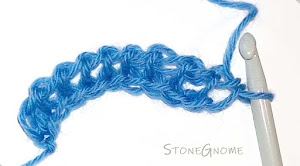A slim and light scarf is always useful — whether in spring or fall, on chilly summer nights, or indoors during the cold winter months.
This scarf is also the PREMIERE of the unique Tunisian Breeze Stitch — a stitch I absolutely love for its softness, texture, and drape!
It’s flexible lengthwise and, despite its long, ribbed texture, feels wonderfully light and delicate — the perfect way to show off this beautiful new stitch.
The Slim Tunisian Breeze Scarf pattern
The Slim Tunisian Breeze Scarf Pattern includes:
- Yarn and stitch guides
- Helpful photos and clear written instructions (3 pages)
- A cheat sheet and a chart for easy reference

Slim Tunisian Breeze Scarf
The Tunisian Breeze Stitch
The Tunisian Breeze Stitch is a Tunisian crochet stitch pattern, I designed and named. I wanted something new - easy to work, and with open stitches and as few 'knots' as possible.
The stitch is very easy to work with, curl-free, and reversible. Once you get the stitch and find a rhythm, it works up quickly — pure crochet relaxation.
"Easy and fun to work up."
"Great stretchiness."
"Very stretchy!"
"Once you get the flow, it’s very easy and goes really fast."
"An intriguing way to work Tunisian crochet."
"No curl!"
Yarn Matters
It’s important to know that cotton - and similar stiff yarns - will not work well with this stitch, as cotton has no stretch.
The stitch pattern requires a soft, drapey yarn with some stretch-and-rebound when you pull it. The best choice is a yarn based on animal fibers like wool yarn and Alpaca blends. They really make the stitch pattern pop, adding depth and softness.
Acrylic can be used — just be aware that the texture will be less defined. However, a soft, stretchy acrylic will still make it lovely in its own way.
Yarn Thickness
As this is a slim, lightweight scarf, it’s designed for relatively thin yarn.
Choose something with at least 210m/50g (or 230 yds per 1.76 oz) — or even finer. This falls into the fingering or sport weight range (US) or 4-ply/Sport in UK terminology, but toward the lighter end.
Hook
You do not need a special Tunisian hook for this — a normal, straight crochet hook without a handle is perfect. You can wrap a rubber band around the far end to improve grip and prevent loops from falling off.
Hook & Swatch
Grab a 4–5mm hook and make a few small swatches (instructions are in the pattern). Then select the hook size that works best for your yarn.
Yarn Usage and Blocking & Stretching
With a yarn as described above and a 4-5mm hook, you’ll need less than 400m (440 yds) of yarn.
The stitch is extremely stretchy — a scarf measuring 140 cm (55 in) can easily stretch to 2 m (79 in) after washing and blocking. And yes, you should wash and block it! It really brings out the ribbing and adds impressive length to the finished scarf.
EXCEPT if you use 100% acrylic. Acrylic does not stretch much with blocking. In this case, plan to use about 30% more yarn and crochet to the full final length you want.
A little Encouragement
























 Did you ever think about how many different crocheted ribbings there exist? I think most of us just do whatever a pattern tells us - or you find a page telling you 'how to crochet a ribbing'. As in one ribbing.
Did you ever think about how many different crocheted ribbings there exist? I think most of us just do whatever a pattern tells us - or you find a page telling you 'how to crochet a ribbing'. As in one ribbing.




















